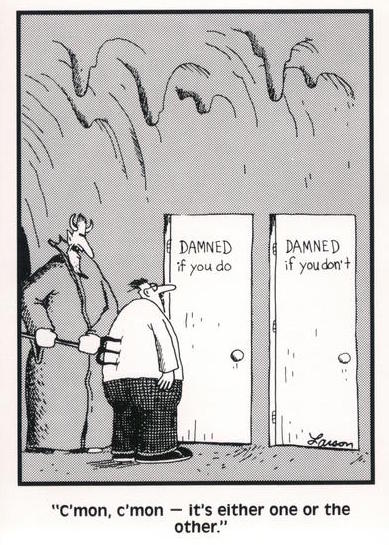Decision Making and the Tyranny of False Choices

How many times have you lost sleep over what was ostensibly a high stakes, critical and difficult decision to make? Maybe you agonised over the alternatives on offer, focused relentlessly on the pros and the cons, ruminated on the consequences of each option and made a meticulous, thoroughly thought out, distilled choice. Except, that the decision itself need not have been made.
Every day — every single day — in the world, we are being called upon to make false choices. Choice that we need not — should not — make. Choices that create unnecessary problems for the individual and the society. The kind of choices, where you lose, the moment you choose one thing over the other.
Politicians, for instance, routinely ask us to make choices between a cleaner environment and more economic growth. Women who take time off from their careers to start a family are routinely tagged as being ‘pro-family’ while women who continue to work are seen as ‘feminist messiahs’ of free choice.
Businesses are asked to choose between ‘data driven’ decisions or ‘gut’ based decisions. The framing is smart. The new way of doing it is anointed as the ‘money ball’ way or the old way to do it is well, the ‘Steve jobs’ way. The point is you don’t have to choose either of the two. You can look at the data and also account for intuition.
There are false choices galore all across the social choices spectrum. In countless debates around feminism at the time of American elections, the debate was fallaciously framed on the lines of either supporting Hillary Clinton for President and proving your feminist credentials or running the risk of being seen as someone who doesn’t believe in women’s rights. Truth is you can stand for a cause without supporting a person.
Another example of common false binary choice is being asked to decide between having a ton of shallow friends or a handful of real ones. Reality, alas, is a little bit more complex than that. It is entirely possible to have a handful of friends who are shallower than a kids’ swimming pool or a room full of companions that want nothing but the very best for you. There are all kinds of friendship on the continuum with differing levels of intimacy. You don’t have to choose between a “real” few and “superficial” many.
Or consider this common statement ‘I believe it’s more important to be authentic and honest than it is to be positive and enthusiastic. False choice alert. You can, on most days, find a way to be authentically enthusiastic or honestly positive.
False choices do not reflect the full nature of reality and have become a trite substitute for serious thinking. They serve, all too often, to obscure rather than to clarify.
None of us should, for example, have to decide between safety and liberty.
Elsewhere, there is the paralysing false choice between quality and price. Many of us have a mental model that if something is more expensive, it must necessarily be better.
In reality, you can spend a lot of money and get a high quality product and you can spend a lot of money and get a poor quality product.
You can spend little money and get a poor quality product. And you can spend little money and get a product that exactly fulfils your needs.
One can go on. There are meaningless jobs that are poorly paid and there are meaningless jobs that are brilliantly paid. Ditto for meaningful jobs.
False choices can severely limit the tapestry and expanse of options in every area of life. Although initially comforting, they can leave you feeling trapped and blind you to other choices you might make.
That said, its easy to see why we unwittingly fall for the trap of false choices — it reduces cognitive load on the brain and simplifies the decision making process. Instead of facing a bewildering array of options, you limit yourself to a few simple possibilities. Also, the way the options are set up for us usually makes it obvious that one choice is the high-minded, call for duty, laudable choice, and the other being a shallow, self serving option.
One of the strong reasons for the prevalence and the acceptance of false choice syndrome is that we are all taught from an early age to internalise — to the point of sub conscious conditioning — that there is always a price that needs to be paid for making a choice.
Truth is some people get to have their cake, eat it and not grow fat, whilst others get hit by a speeding car — driven by a drunk driver who gets away scot free — while trying to crossing the road to get their hands on a piece of left over bread thrown in the garbage bin. There is no limit to the absurdism that there is in life and in society and any attempt to sanitise or simplify these narratives are fundamentally tropes designed to stop you from meeting your fullest expression. Its a mental model that is broken.
Some trade offs you have to make in life. But many times there are no trade offs. The answer is not an artificially constrained ‘either — or’. The answer can be both or none, thank you very much.
Of course, there may be cases when the number of options really is limited. For example, if the jump suit is available only in black and white, it would be a waste of time to think you can get one in blue.
For the most part though, it is the kind of thinking that limits our understanding of how the world really works. It creates a misleading and unhelpful view of reality by deluding us into thinking there are only extreme, with us or against us options.
Unmasking the tyranny of false choices is terribly important for anyone who cares about the direction in which the human race and society is progressing. For, we need *both* the government and the market; greater equality must co-exist with the need to incentivise excellence, finding a balance between respect for tradition and a commitment to individual freedom is key, to name only a few tenets of every day life.
None of these are Hobson’s choices. Whoever else may gain, the person who makes that choice, always loses.
There are many shades of the false choice — all-or-nothing fallacy, black-and-white thinking, the fallacy of exhaustive hypotheses, bifurcation, excluded middle, no middle ground and artificial polarisation.
When only two choices are presented yet more exist, or there are omissions or a spectrum of possible choices that exist between two extremes, It is useful to ask a few questions.
Here is an indicative but non exhaustive list:
Why do I do things in a certain way? Is there a pattern, an implicit mental model to all my decisions? What options have I failed to consider? What are the complementary elements that can create a virtuous cycle/multiplier effect?
Maybe the last time you chose lowering costs instead of improving quality, you could have provided an option that added features to the product at a higher cost. In almost any business, there are a set of customers, who equate price with quality. People who step out of the home wanting to spend an X amount of money. The satisfaction they get is a function of the money they spend, not the product they buy. Some restaurants capitalise on it; they know that when someone is very hungry, they are likely to order something they think will fill them well; ergo the option of ordering unlimited food and drink at a ridiculously high price.
Even our political taxonomy is entirely unscientific and mostly mapped on a continuum of false choices. The smartest politicians — Obama, Modi and Trump amongst them — use the the false choice as a rhetorical device. Routinely and almost as a matter of ritual, they frame and reframe arguments as extreme positions on both the left and the right and placing themselves at the sensible center. It would be comical if it weren’t so callous.
Next time some one asks you to choose “altruism” vs. “self interest,” consider this : What if we seek enjoyment and pleasure in helping others? And what if taking care of our own well-being is an important first step in helping others?
If someone corners you on “free will vs. determinism,” know that we have some control over some aspects of our lives, like our choices and our habits, but we aren’t in control of everything, like our genetics, life circumstances, or random events.
It’s important to acknowledge that we definitely have some control over our lives, just not in everything. Being able to distinguish between the two is crucial for directing our focus to what we can change in our lives, and accepting what we cannot change.
Sometimes, the falsity of a false choice comes from the fact that both choices are true. The opposite of a great truth is very often another great truth
You have more time than you think and less time than you think. You can accept yourself and expect more from yourself.
Very often in life, and certainly in the options rich world that we live in, there exist more than two choices. There is more than one way to dance.
You don’t have to either do a job that pays your bills or follow a higher calling that may emancipate your soul. The choice is not between career suicide and spiritual suicide.
Eventually, the quality of your life is a direct function of the quality of the questions you are willing to ask.






Leave a Reply